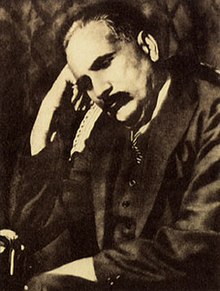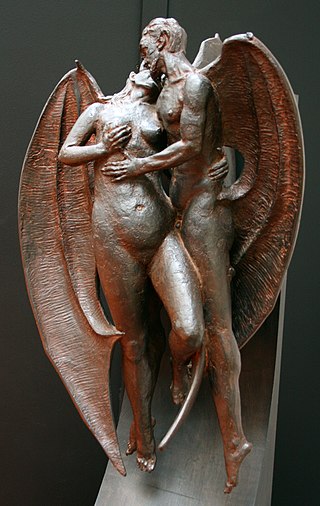
A devil is the personification of evil as it is conceived in various cultures and religious traditions. It is seen as the objectification of a hostile and destructive force. Jeffrey Burton Russell states that the different conceptions of the devil can be summed up as 1) a principle of evil independent from God, 2) an aspect of God, 3) a created being turning evil, and 4) a symbol of human evil.

Iblis, alternatively known as Eblīs, is the leader of the devils in Islam. According to the Quran, Iblis was thrown out of heaven, after he refused to prostrate himself before Adam. Due to the similarities of a being cast out of heaven, he is often compared to the equivalent of the Christian Satan.
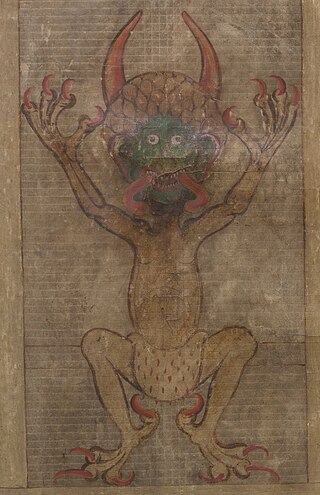
Satan, also known as the Devil, and sometimes also called Lucifer in Christianity, is an entity in Abrahamic religions that seduces humans into sin or falsehood. In Judaism, Satan is seen as an agent subservient to God, typically regarded as a metaphor for the yetzer hara, or "evil inclination". In Christianity and Islam, he is usually seen as a fallen angel or jinn who has rebelled against God, who nevertheless allows him temporary power over the fallen world and a host of demons. In the Quran, Shaitan, also known as Iblis, is an entity made of fire who was cast out of Heaven because he refused to bow before the newly created Adam and incites humans to sin by infecting their minds with waswās.

Fallen angels are angels who were expelled from Heaven. The literal term "fallen angel" does not appear in any Abrahamic religious texts, but is used to describe angels cast out of heaven or angels who sinned. Such angels often tempt humans to sin.
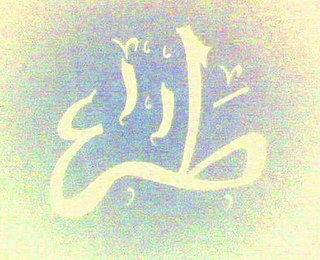
Ṭā Hā is the 20th chapter (sūrah) of the Qur'an with 135 verses (āyāt). It is named "Ṭā Hā" because the chapter starts with the Arabic ḥurūf muqaṭṭaʿāt: طه (Ṭāhā) which is considered to be one of the names of the Islamic prophet Muhammad.

Muhammad Izhar ul Haq is a poet of Urdu language, a columnist and analyst from Pakistan. He has received national and international recognition for his contribution to Urdu literature and journalism, and has been awarded various literary and national awards, including Pakistan's highest civil award Pride of performance in 2008, for his services in the field of literature and poetry. He has published five books of Urdu poetry and writes column in Daily 92 News, under the title "Talkh Nawai (تلخ نوائ)".

Armaghan-i-Hijaz was a philosophical poetry book of Allama Iqbal, the great poet-philosopher of Islam.
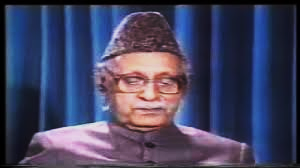
Ghulam Ahmad Parwez was a well-known teacher of the Quran in India and Pakistan. He posed a challenge to the established Sunni doctrine by interpreting Quranic themes with a logical approach. The educated populace held Parwez in high esteem, despite his encounter with numerous criticisms from conservative Islamic scholars throughout his tenure. The work 'Islam: A Challenge to Religion' is widely acknowledged as one of the most significant works in the history of Pakistan, according to Nadeem F. Paracha.

"Tarana-e-Milli" or "Anthem of the Community" is an enthusiastic poem in which Allama Mohammad Iqbal paid tribute to the Muslim Ummah (nation) and said that Islam is the religion of the world. He recognized all Muslims anywhere in the world as part of a single nation, whose leader is Muhammad, the prophet of the Muslims.

Abdussalam Puthige is the Editor-in-Chief of Varthabharathi, a Kannada daily Newspaper, published from Mangalore the coastal city of Karnataka and Bangalore, the state capital. The first issue of Vartha Bharathi hit the stands on 29 August 2003 from Mangalore.

A shaitan or shaytan is an evil spirit in Islam, inciting humans and jinn to sin by whispering in their hearts. Although invisible to humans, shayatin are imagined to be ugly and grotesque creatures created from Hellfire. In Islamic tradition, and in contrast to Christian tradition, devils are not a supernatural manifestation but psychological phenomena.

Anwar Shah Kashmiri was an Islamic scholar from Kashmir in the early twentieth century, best known for his expertise in the study of hadith, a strong memory, and a unique approach to interpreting traditions, as well as the fourth principal of Darul Uloom Deoband. With an ancestral heritage of religious scholarship rooted in Baghdad, he acquired training in Islamic sciences at Darul Uloom Deoband under the mentorship of Mahmud Hasan Deobandi, alongside enjoying a spiritual journey with Rashid Ahmad Gangohi. Initiating his vocation as the first principal of Madrasa Aminia, he embarked on a hajj in 1906 with a sojourn in Medina, dedicated to exploring the depths of hadith literature. Subsequently, he joined Darul Uloom Deoband, serving as the post of Sheikh al-Hadith for nearly thirteen years before choosing Jamia Islamia Talimuddin as his final destination for his academic voyage. Although he displayed limited inclination toward the written word, a handful of treatises flowed from his pen. Yet, the bulk of his literary legacy has been preserved through the efforts of his students, who transcribed his classroom lectures, discourses, and sermons. While the crux of his scholarly work centered on championing the Hanafi school and establishing its supremacy, he also garnered recognition for his comparatively liberal approach to various religious matters. His publications found their place under the patronage of Majlis-i Ilmi, a scholarly institution established in Delhi in 1929. His scholarly credentials received official endorsement with the publication of Fayd al-Bari, a four-volume Arabic commentary on Sahih al-Bukhari, curated by Badre Alam Merathi and published in Cairo, with the financial support of Jamiatul Ulama Transvaal.

In the Hebrew Bible, the destroying angel, also known as mashḥit, is an entity sent out by God on several occasions to deal with numerous peoples.
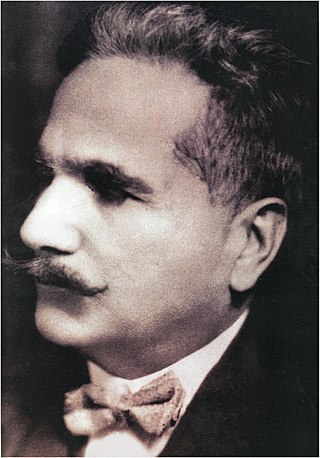
Sir Muhammad Iqbal was a South Asian Islamic philosopher, poet and politician. His poetry is considered to be among the greatest of the 20th century, and his vision of a cultural and political ideal for the Muslims of British-ruled India is widely regarded as having animated the impulse for the Pakistan Movement. He is commonly referred to by the honourific Allama. and widely considered one of the most important and influential Muslim thinkers and Western religious philosophers of the 20th century.

The Mosque of Cordoba is an eight-stanza Urdu poem by Muhammad Iqbal, written circa 1932 and published in his 1935–36 collection Bāl-e Jibrīl. It has been described as "one of his most famous pieces" and a "masterpiece". It has also been compared to Ahmad Shawqi's Arabic poem Siniyyah for its locating in Islamic Spain "the embodiment of the ideal, non-territorial Islamic nation" that is, in both poems' world-views, "the source of world history."

Idris Azad born on 7 August 1969, is an author, philosopher, novelist, poet, dramatist and columnist. He has written several books on fiction, journalism, critic, poetry, philosophy, mysticism and art. He is teacher of logic and philosophy at International Islamic University, Islamabad. Idrees Azad is also associated with Pakistan Film Industry. He is Head of the Department of VFX & CGI at Paragon Academy of Performing Arts, Shabab Noor Studio, Lahore and assists the director Syed Noor in film making as well.

Saqi Namah often transliterated in English as Saqi Nama is an Urdu Nazm that was written by Muhammad Iqbal, also known as Allama Iqbal. This is one of the Iqbal's most famous lengthy poems apart from Tulu'i Islam, Shikwah and Jawab-e-Shikwah. This poem was published in his book, Baal-e-Jibreel, often translated in English as Gabriel's Wing.
Ale Ahmad Suroor (1911-2002) was an Urdu poet, critic and professor from India. He is best known for his literary criticism. In 1974 he was honoured with the Sahitya Akademi Award by the Government of India for his literary critic work, Nazar aur Nazariya. In 1991 he was also awarded the Padma Bhushan, India's third highest civilian award. He was awarded a special gold medal by the President of Pakistan on the centenary of the birth of Muhammad Iqbal.
Jann are the ancestor of the jinn in Islam. They are said to have inhabited the earth before Adam, ruled by a king called Jann ibn Jann. In folklore however, many consider them to be punished and turned into the weakest class of jinn, comparable to the way in which apes are seen as transformed humans. The father of the jinn is also called Abu Al-Jann.

This page list topics related to Muhammad Iqbal.
